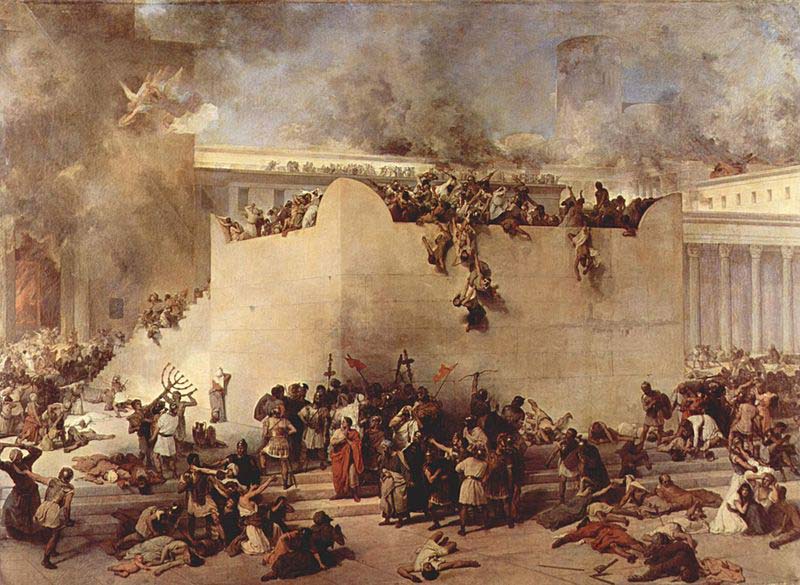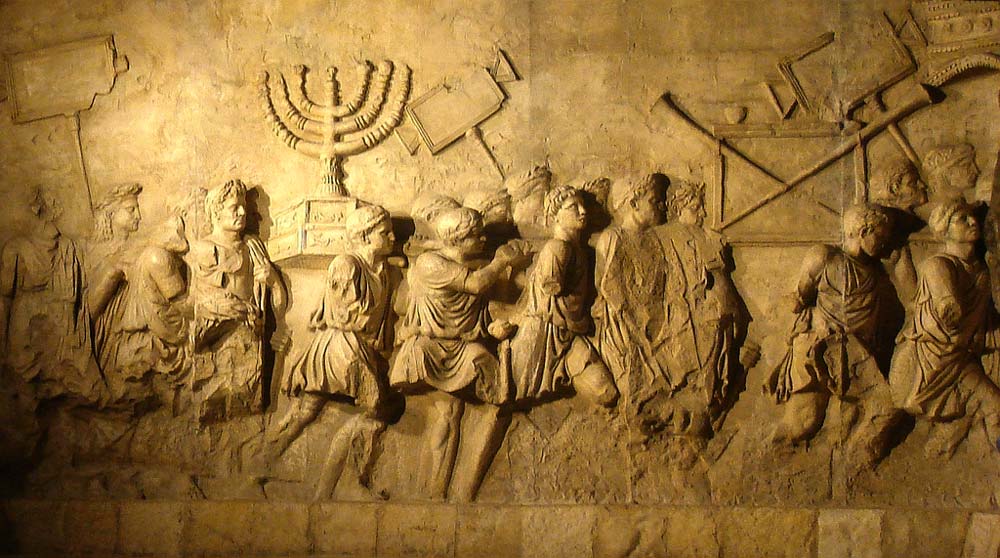| Titus | |
|---|---|
 |
|
| Roman Emperor | |
| In Power | June 24, 79 – Sept. 13, 81 |
| Born | Dec. 30, 39 Rome |
| Died | Sept. 13, 81 (at age 41) Rome |
| Royal House | Flavian |
Titus (39-81 A.D.) was a Roman general, and later Emperor, who enjoyed both success on the battlefield and personal popularity as ruler. His most significant military achievement was the crushing of a Jewish revolt in 70; the Arch of Titus in Rome was erected in his honor. Although the people were suspicious of him for his controversial relationship with a Jewish woman and his leadership of the unpopular Praetorian Guard, after becoming Emperor he won great acclaim. His death after just two years in power was widely mourned.
Early Life
Titus was born in Rome in late December, 39, the eldest son of the future Emperor, Vespasian. His younger brother, Domitian, would eventually succeed Titus as Emperor. At first, the family did not enjoy particular wealth or prestige, although the reign of Claudius allowed an improvement in status. Titus was able to study with Britannicus, Claudius’s son, and learned Greek, Latin, and rhetoric. This gave Titus a firm foundation for a senatorial career.
His first military role was that of tribune in Germany, in the late 50s. A little later, he served in the same role in Britain, helping to put down the Boudican revolt. After this, he returned to Rome and began a legal career, hoping to make a name for himself. He also married Arrecina Tertulla, although their time together was brief as she died in 65, after which Titus was married again, this time to Marcia Furnilla. Again the marriage was to be short: Titus divorced her, perhaps due to her reputed involvement in a plot against Nero.
The First Roman-Jewish War
 In 66, a revolt broke out in Judaea, with the Jewish uprising forcing the legate of Syria out of Jerusalem. King Agrippa II, who was known to favor the Romans, was forced to flee to Galilee with his sister. Nero assigned Vespasian to quell the revolt, and was given two legions to command, adding a third on the journey for a total of 60,000 troops. They expected a quick victory, but in the event, the city of Jotapata held out against a siege for more than 40 days before being overwhelmed.
In 66, a revolt broke out in Judaea, with the Jewish uprising forcing the legate of Syria out of Jerusalem. King Agrippa II, who was known to favor the Romans, was forced to flee to Galilee with his sister. Nero assigned Vespasian to quell the revolt, and was given two legions to command, adding a third on the journey for a total of 60,000 troops. They expected a quick victory, but in the event, the city of Jotapata held out against a siege for more than 40 days before being overwhelmed.
Vespasian had given command of one legion to his son, and Titus proved able in the role. In June 68, Nero died, and Titus strongly supported Vespasian in the struggle to lead the Empire; Titus was by now being remarked upon as a great asset for his father. After the turmoil of the Year of the Four Emperors in 69, which ended victoriously for Vespasian, the new Emperor wasted no time in placing Titus in overall control of the Jewish war. His son repaid his father’s confidence by taking Jerusalem in 70 to bring an end to the rebellion.
Titus had inspired great loyalty and devotion among his soldiers, who begged him to go with them back to Rome. It is considered by some authorities that there may have been an ulterior motive for their urging: there was some talk that Titus was mulling over the possibility of replacing Vespasian on the throne. In the event, Titus went back to Rome without the legions, and was awarded a joint triumph with his father. As a further reward for his military success, Vespasian made Titus the commander of the elite Praetorian Guard.
Advancement in Rome
 Vespasian’s pride and confidence in his son’s abilities is further demonstrated by his award of tribunician status to Titus, as well as allowing the two of them to work side by side during the great census of 73. Titus was also awarded a number of consulships, although Vespasian was careful not to elevate him to the status of a co-ruler. Titus was, however, very much in charge of the imperial military, giving him great power and potentially making him very dangerous to the establishment.
Vespasian’s pride and confidence in his son’s abilities is further demonstrated by his award of tribunician status to Titus, as well as allowing the two of them to work side by side during the great census of 73. Titus was also awarded a number of consulships, although Vespasian was careful not to elevate him to the status of a co-ruler. Titus was, however, very much in charge of the imperial military, giving him great power and potentially making him very dangerous to the establishment.
Titus’s unpopularity at this time stemmed partly from his power over the Praetorians, who were resented by the people for their arrogance and brutality. His position was made worse by the way in which he flaunted his relationship with Berenice, the sister of Agrippa II. Although Titus tried to install Berenice in the imperial palace as his consort, public opinion was violently against the idea of a foreign wife for an Emperor; the example of Cleopatra was still fresh in many people’s minds. Eventually, Titus was forced to send Berenice away, and though he tried to bring her back a few years later, the result proved to be the same.
Titus in Power
Despite being briefly threatened by a conspiracy in early 79, which ended in failure, Titus remained the unchallenged heir to Vespasian. When the latter died on June 23rd of that year, Titus’ succession was smooth and without incident, a fact welcomed by most Romans. He endured a poor relationship with Domitian, his younger brother, partly on account of Titus’ unexpected resurgence of popularity as ruler. Domitian was resentful and jealous, and there were whispers that he was plotting the downfall and death of his older brother, although these rumors were never proved.
As Emperor, Titus was a huge success. His educated manner, ability to get along with people, and extreme good looks meant that he was idolized by many of his subjects. Titus also took care to provide highly visible signs of his regard for the city of Rome, of which the best known was the Colosseum, officially known as the Flavian Amphitheater, which was completed in 80. In that year also, Titus provided substantial funds to restore Rome after a devastating fire, and he gave significant support to the Campanian region in the wake of the destruction caused by Mount Vesuvius’ eruption.
Death and Legacy
The opening of the Colosseum was marked with a hundred days of games, over which Titus presided. He then officiated at the dedication of the amphitheater, and its associated public baths, before leaving for the Appennines. Having traveled only a short distance, he was struck by a fever, and his health quickly declined. It became obvious that Titus would not recover, and his brother succeeded to the throne, declaring his predecessor a god but later becoming an unstable and often brutal Emperor.
Just before he died on September 13, 81, Titus is said to have declared that he had made only one mistake in life. This statement is thought by most authorities to refer to his leniency toward his disloyal brother. Titus had been Emperor for only two years, but was generally considered to have been a success in the role. This assessment is colored by the fact that Domitian became one of the most hated and feared rulers of the period, and so the contrast with Titus was deliberately played up.